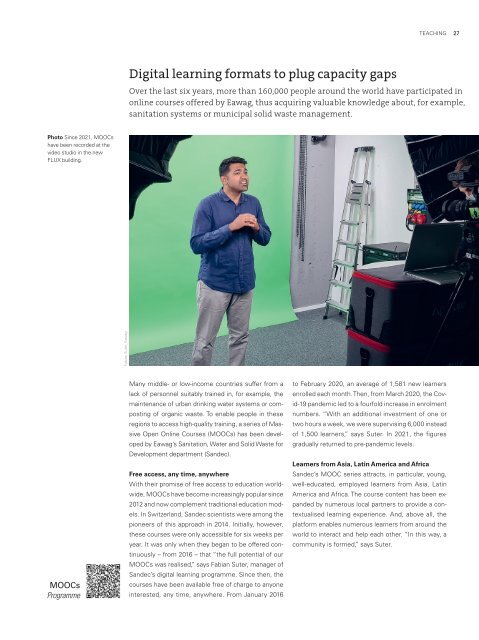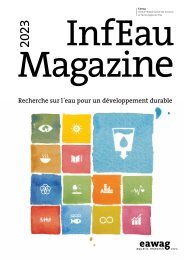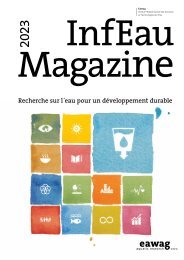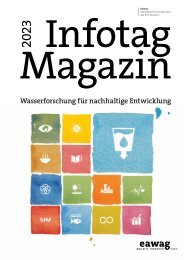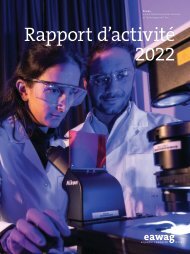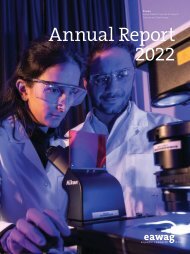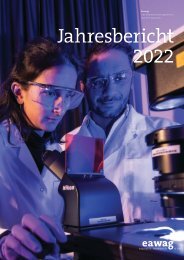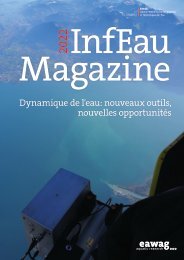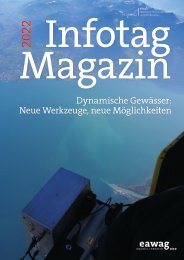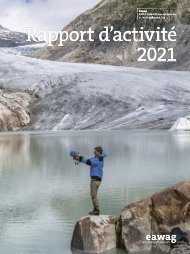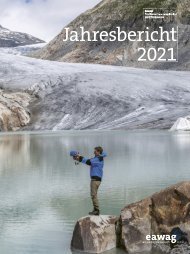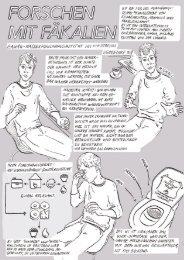Eawag Annual Report 2021
The Annual Report gives a wide-ranging account of current Eawag projects. It is published in English and German, and since 2013 also in French.
The Annual Report gives a wide-ranging account of current Eawag projects. It is published in English and German, and since 2013 also in French.
You also want an ePaper? Increase the reach of your titles
YUMPU automatically turns print PDFs into web optimized ePapers that Google loves.
TEACHING 27<br />
Digital learning formats to plug capacity gaps<br />
Over the last six years, more than 160,000 people around the world have participated in<br />
online courses offered by <strong>Eawag</strong>, thus acquiring valuable knowledge about, for example,<br />
sanitation systems or municipal solid waste management.<br />
Photo Since <strong>2021</strong>, MOOCs<br />
have been recorded at the<br />
video studio in the new<br />
FLUX building.<br />
Fabian Suter, <strong>Eawag</strong><br />
MOOCs<br />
Programme<br />
Many middle- or low-income countries suffer from a<br />
lack of personnel suitably trained in, for example, the<br />
maintenance of urban drinking water systems or composting<br />
of organic waste. To enable people in these<br />
regions to access high-quality training, a series of Massive<br />
Open Online Courses (MOOCs) has been developed<br />
by <strong>Eawag</strong>’s Sanitation, Water and Solid Waste for<br />
Development department (Sandec).<br />
Free access, any time, anywhere<br />
With their promise of free access to education worldwide,<br />
MOOCs have become increasingly popular since<br />
2012 and now complement traditional education models.<br />
In Switzerland, Sandec scientists were among the<br />
pioneers of this approach in 2014. Initially, however,<br />
these courses were only accessible for six weeks per<br />
year. It was only when they began to be offered continuously<br />
– from 2016 – that “the full potential of our<br />
MOOCs was realised,” says Fabian Suter, manager of<br />
Sandec’s digital learning programme. Since then, the<br />
courses have been available free of charge to anyone<br />
interested, any time, anywhere. From January 2016<br />
to February 2020, an average of 1,581 new learners<br />
enrolled each month. Then, from March 2020, the Covid-19<br />
pandemic led to a fourfold increase in enrolment<br />
numbers. “With an additional investment of one or<br />
two hours a week, we were supervising 6,000 instead<br />
of 1,500 learners,” says Suter. In <strong>2021</strong>, the figures<br />
gradually returned to pre-pandemic levels.<br />
Learners from Asia, Latin America and Africa<br />
Sandec’s MOOC series attracts, in particular, young,<br />
well-educated, employed learners from Asia, Latin<br />
America and Africa. The course content has been expanded<br />
by numerous local partners to provide a contextualised<br />
learning experience. And, above all, the<br />
platform enables numerous learners from around the<br />
world to interact and help each other. “In this way, a<br />
community is formed,” says Suter.


